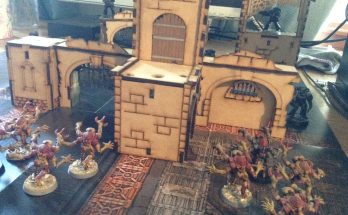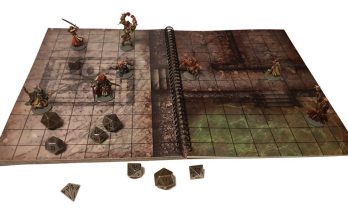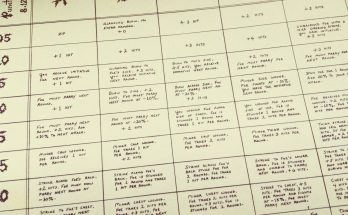d20 Modern the role-playing game is a strange beast that has grown on me over time. On my first read through of the rules I disliked it on many levels. While I liked some of the innovations in the system – the Wealth system in particular – I didn’t approve of the treatment of classes, or it’s overall lack of direction. It seemed to be trying to be a rules-system for all genres, and failing to hit them all.
Time and perceptions change however. Where I previously saw flaws, I can now see them as the inspired concepts that they are. In many ways I’ve come to see d20 Modern as the masterpiece that it is; it’s not perfect by any means, but d20 Modern is the closest thing we have of a system that’s able to handle Cinematic Action Adventure role-playing in the Modern age, and beyond.
This is a review of d20 Modern though a fresh set of eyes.
From the perspective of a D&D gamer, the largest change is in the treatment of Classes. In D&D, these define what your character can do at the fundamental level; to say “my character is a Fighter” or “my character is a Sorcerer” is the single biggest thing you can say about your PC’s abilities, skills, and contribution to the adventuring party. Everything else is just gloss.
In d20 Modern though, the Base Classes don’t so much reveal what the character can do, but shows who they are. It’s a subtle difference, but an important one. Rather than defining their job role in the party, the Base Classes simply say “my character is Tough”, “my character is Smart”, etc. This is then layered onto the character’s occupation to round out the character in more detail than is possible in core D&D. A Smart Academic would be very different to a Charismatic one, for example. The interplay between the Classes and Occupations can create a dynamic that’s nothing short of inspired. While some Occupations would naturally draw certain classes (the Charismatic Celebrity, for example), it’s by no means enforced or encouraged.
It’s possible to put together a party who all share the same Occupation (and even Classes) and create a widely different set of characters. For example, a group of all Military characters could consist of the Tough sergeant, Smart field tech, Fast scout, Smart medic and Strong private. They all have the same Occupation, but they are widely different in play. Similarly, a Strong Criminal and a Strong Emergency Services worker would be very different in play. In D&D, put two Rangers of the same level (for example) together and there’s not a lot to differentiate them. Only the Fighter with it’s large number of available feats comes close to d20 Modern’s flexibility.
The granularity goes further, however. Because of the large number of Feats and Talents available to every character, no two are the same even though their Class and Occupation may be the same. Add in the access to skills and the fact that multi-classing between Base Classes is positively encouraged and you’ve a system that lets characters develop organically in a way few other systems do.
Next up we have Advanced Classes. These are closer in feel to traditional D&D base classes, but have prerequisites that must be met before entry. Most of these classes are accessible from around 4th level onwards with forward planning. They are slightly more powerful than the Base Classes, but are also more specialised in one area of expertise. In practice these are just like prestige-classes with low entry requirements. An example would be the Soldier, with it’s requirements of +3 BAB, Knowledge (Tactics) 3 ranks and Personal Firearms Proficiency. A Strong character could easily qualify as a soldier by 4th level, and a Smart one by 6th without multi-classing. This adds in another dynamic to the mix, as a Strong Soldier with a Military occupation background would be very different to a Smart Soldier who was a white-collar worker. Advanced classes also gain more Action Points, encouraging cinematic play. More on that later.
It’s worth noting that there’s no association between the Advanced Classes and a character’s starting occupation. As a GM I’d be likely to limit access to certain Advanced Classes based upon such things as occupation, availability, etc, so it’s not such a big thing but I would have expected a paragraph or two detailing how the two interact. Just remember that this is the Cinematic world of d20 Modern where White Collar Workers can be Martial Artists in the finest Steven Segal tradition 
At some point in the not-too-distant future the 4th Edition of D&D will make an appearance and I for one would be happy to see d20 Modern’s take on Base and Advanced Classes adapted into the fantasy realm. There are already netbooks available that have made the step. It wouldn’t surprise me to see Smart Wizards, Fast Fighters and Tough Rogues in hardback form at some point, though I don’t think it’s too likely. D&D gamers are a notoriously conservative lot.
Prestige Classes further pad out the character options. Unlike Advanced Classes, these are more closely tied to the campaign setting and help reinforce the genre. While Soldiers, Martial Artists and Field Scientists will fit pretty much anywhere, you’ll only find (or need) a Shadow Slayer prestige class in a setting where Vampires, Werewolves and Zombies roam the streets. These operate much like D&D Prestige Classes, so there’s no surprises for most gamers.
That’s enough for now. Next up I’ll take a look at the combat mechanics.



